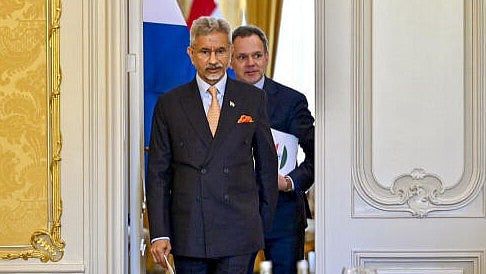
External Affairs Minister S Jaishankar.
Credit: PTI Photo
New Delhi: The US was in the United States, External Affairs Minister S Jaishankar said, rejecting American President Donald Trump’s repeated claims about his administration brokering a “ceasefire” between India and Pakistan after four days of cross-border military offensives and counter-offensives from May 7 to 10.
He also emphatically rejected the narrative that the state actors of Pakistan were not involved in exporting terrorism to India. “Suppose that there were large military centres in the middle of a city like Amsterdam, where tens of thousands of people gathered for military training, would you say that your government knows nothing about that? Of course not.” Jaishankar told Dutch newspaper De Volkskrant during his recent visit to the Netherlands.
"We should not go along with the narrative that Pakistan does not know what is going on. The most notorious terrorists on the United Nations (UN) sanctions list are all in Pakistan. They operate in the big cities, in broad daylight. Their addresses are known. Their activities are known. Their mutual contacts are known. So, let's not pretend that Pakistan is not involved. The state (of Pakistan) is involved. The (Pakistani) army is up to its neck in it,” said the external affairs minister.
Jaishankar said that he, himself, and Prime Minister Narendra Modi had received calls from US Secretary of State Marco Rubio and Vice President J D Vance after Pakistan targeted civilians and military installations in India after the Indian Army and the Indian Air Force had carried out strikes targeting only the terrorist camps in the neighbouring country as well as the areas illegally occupied by it. But, he added, they only conveyed the US concerns over the cross-border flare-up, which had brought the two South Asian nations to the brink of war.
“The US was in the United States,” Jaishankar told Dutch public broadcaster Nederlandse Omroep Stichting, in response to a question about the involvement of the Trump Administration in bringing the offensives and counter-offensives between India and Pakistan to a halt. "When two countries are engaged in a conflict, it is natural that countries in the world call up and try to sort of indicate their concern," he said, but added: “We made one thing very clear to everybody who spoke to us, not just the United States, but to everyone, saying if the Pakistanis want to stop fighting, they need to tell us. We need to hear it from them. Their general has to call up our general and say this. And that is what happened.”
The cessation of firing and military action was negotiated directly between India and Pakistan, he stressed.
Jaishankar also rejected Trump’s offer to help India and Pakistan settle the dispute over Kashmir.
“It is a bilateral issue between the countries involved. This is something we will do together with Pakistan,” said the external affairs minister.
New Delhi has been steadfastly maintaining for years that the 1972 Simla Agreement between India and Pakistan and the 1999 Lahore Declaration had left no scope for any third party to play any role in resolving the issues between the two neighbours.
In response to the killing of 26 people, mostly tourists, by a gang of Pakistani and Pakistan-trained terrorists at Baisaran near Pahalgam in J&K on April 22, India on May 7 launched Operation Sindoor targeting the terrorist camps both in the neighbouring nation as well as in the areas illegally occupied by it. Pakistan, however, responded by carrying out retaliatory strikes, targeting the civilians living along the Line of Control and the undisputed stretch of the border as well as the military facilities in India. The armed forces of India foiled and effectively responded to all the strikes by Pakistan. The offensives and counter-offensives came to a halt on May 10, after the two sides reached an understanding.
The external affairs minister said that the ‘Operation Sindoor’ had not ended yet
“The operation continues because there is a clear message in that operation – that if there are acts of the kind we saw on April 22, there will be a response, that we will hit the terrorists," he said, adding: “If the terrorists are in Pakistan, we will hit them where they are. So, there is a message in continuing the operation, but continuing the operation is not the same as firing on each other," he said.
